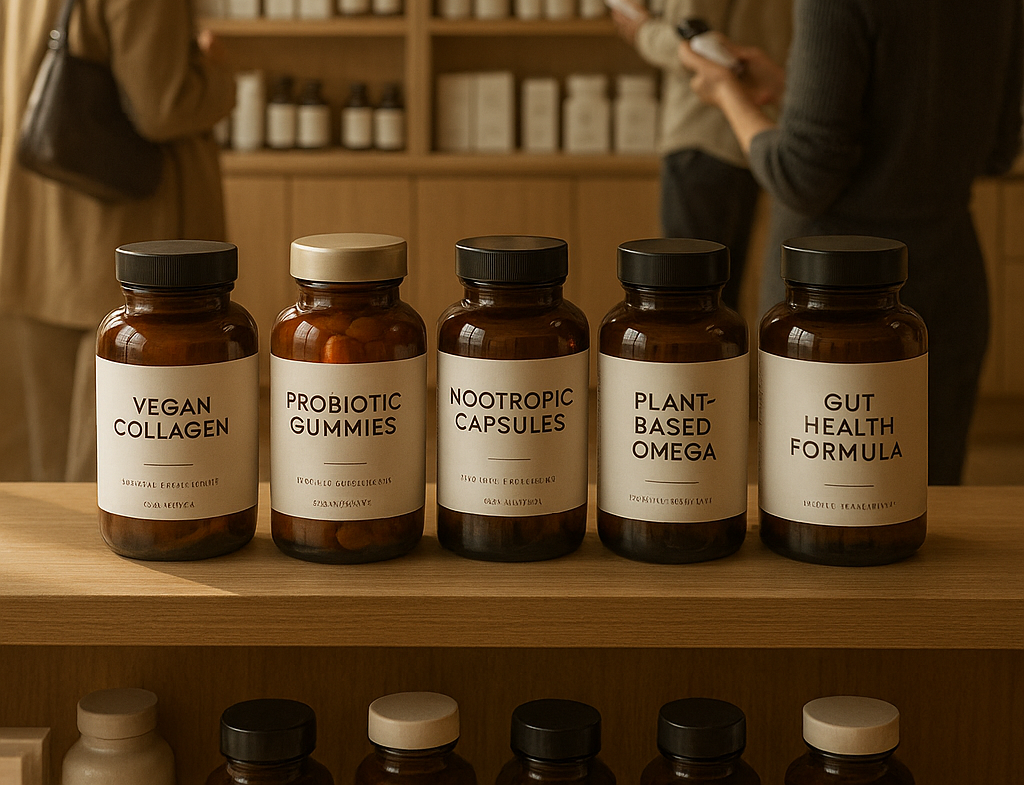The private label supplement market in Europe is no longer playing catch-up — it’s leading. Retailers, pharmacies, and even influencers are launching their own branded products, tapping into a wellness industry that shows no signs of slowing down. Consumers are becoming more informed, more selective, and more values-driven. That’s forcing brands to innovate quickly or risk falling behind.
So what’s hot right now? These seven trends are shaping the private label supplement landscape across Europe in 2025 — and if you’re in the game, you’ll want to be paying close attention.
1. Personalized Supplements Are Now Expected
Personalization isn’t just a buzzword anymore — it’s the baseline. With wearable tech, health apps, and DNA testing becoming part of everyday life, consumers expect their supplements to match their unique biology and lifestyle.
Private label brands are moving fast to meet this demand. We're seeing online quizzes that feed into auto-generated supplement stacks, DNA or microbiome testing kits bundled with subscription services, and AI-based apps recommending doses in real time. In Germany and the Nordics especially, tech-savvy consumers are embracing these offers.
This shift isn’t just about novelty. It builds loyalty. When someone feels a product is “theirs,” they’re more likely to stick with it — and recommend it.
2. Sustainability Is Non-Negotiable
In 2025, “eco-friendly” isn’t a unique selling point — it’s a prerequisite. European consumers, especially Gen Z and millennials, are making buying decisions based on environmental impact.
Private label brands that lead with sustainability are gaining traction. We’re seeing:
-
Plastic-free packaging (e.g., compostable sachets or refillable glass jars)
-
Local sourcing to cut emissions and support regional economies
-
Vegan or plant-based capsules instead of gelatin
-
Carbon-neutral production claims with third-party verification
The trend is especially strong in countries like Sweden, the Netherlands, and France, where climate-conscious consumers expect brands to do more than just slap a green leaf on the label.
3. Stress, Focus & Sleep Support Are Dominating
Mental wellness is the new fitness. The pandemic sparked an increased focus on managing stress, anxiety, and sleep — and that momentum hasn’t slowed.
Supplements targeting cognitive health and relaxation are flying off shelves. Private labels are tapping into this with blends of:
-
Adaptogens like ashwagandha, rhodiola, and holy basil
-
Nootropics such as lion’s mane and citicoline
-
Natural sleep aids like L-theanine, magnesium glycinate, and 5-HTP
Formulations that support productivity without stimulants — think caffeine-free focus blends — are particularly popular among remote workers and students.
A key trend within this category is stacking: pairing products for daytime energy and nighttime recovery. Smart private label lines are branding them as complementary routines.
4. Gut Health Is the New Core Category
Gut health is now a pillar of overall wellness. The European market has moved far beyond basic probiotics. Now, it’s all about:
-
Prebiotics like inulin and FOS
-
Postbiotics — the new kid on the block, gaining ground for their anti-inflammatory benefits
-
Fermented whole-food ingredients, often with local heritage ties (e.g., sauerkraut extract in Germany, fermented barley in Scandinavia)
Private labels are getting smart by combining gut support with other needs — digestion + immunity, or gut health + skin glow, for example. Multi-benefit formulas are proving more attractive than standalone pills.
5. Beauty-From-Within Products Are Booming
Skincare isn’t just topical anymore. Beauty supplements — especially those targeting skin hydration, elasticity, and glow — are huge in 2025. Collagen remains a hero ingredient, but the market has expanded to include:
-
Hyaluronic acid
-
Biotin, zinc, and silica
-
Astaxanthin and other skin antioxidants
This space is particularly ripe for influencer-driven private labels, where aesthetics matter as much as efficacy. Stylish packaging, social media-friendly branding, and limited-edition flavors are common tactics.
What’s changing is the science. Consumers want results backed by clinical data, not vague promises. Brands using patented ingredients with studies behind them (like Verisol® collagen peptides) are pulling ahead.
6. Menopause and Hormonal Health Get Real Attention
The stigma around hormonal health is fading — and the market is finally catching up. Women across Europe are demanding real solutions for PMS, fertility support, and menopause symptoms.
Private label brands that focus on these needs — with transparency and respect — are winning. Popular ingredients include:
-
Chasteberry (Vitex)
-
Black cohosh
-
Dong quai and maca root
-
Vitamin B6, D3, and magnesium
Formulas are also becoming more refined. Rather than one-size-fits-all “women’s multivitamins,” we’re seeing cycle-specific and age-specific blends. Education is key — brands that provide real information and empower consumers tend to build stronger followings.
7. Transparency and Traceability Build Trust
European consumers are highly informed and skeptical of marketing fluff. They want to know where ingredients come from, what they do, and whether there’s science to support the claims.
In response, private label supplement brands are:
-
Publishing lab results and purity certificates
-
Highlighting clinically backed ingredients
-
Providing QR codes to trace ingredient sourcing
-
Using clean label certifications (e.g., Non-GMO, vegan, allergen-free)
This transparency not only builds trust — it also creates a competitive advantage. Many smaller brands now outperform big players by being radically honest.
Final Thoughts
The private label supplement industry in Europe isn’t just growing — it’s evolving rapidly. Retailers and brand owners who want to compete in 2025 must offer more than a low price. They need relevance, quality, transparency, and a clear reason for being.
These seven trends aren’t fads — they reflect deeper shifts in consumer behavior. If you’re launching or scaling a private label line, aligning with these movements could define your success.





